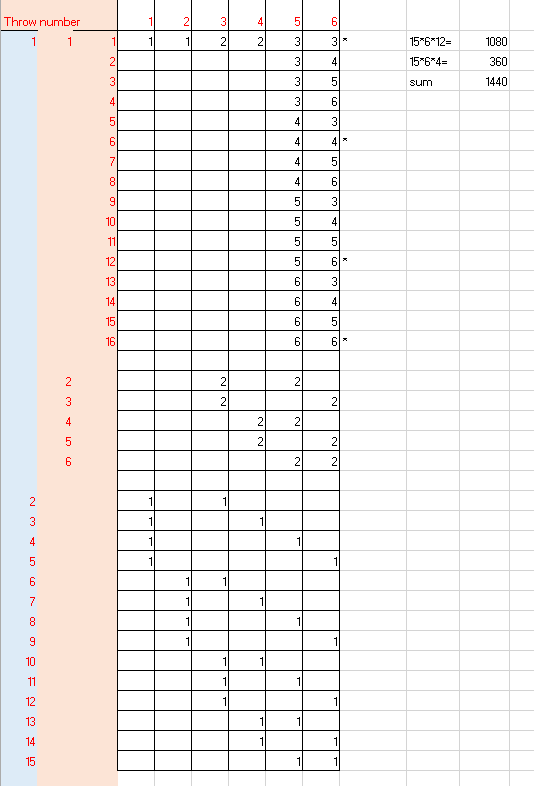Six 6-sided dice are rolled. What is the probability that exactly two of the dice show a 1 and exactly two of the dice show a 2? Express your answer as a common fraction.
P(2 twos and 2 ones and the other two different ) + P(2 sixes and 2 ones and 2 of some other number)
\( =\frac{6!}{2!2!}*(\frac{1}{6}*\frac{1}{6}*\frac{1}{6}*\frac{1}{6}*\frac{4}{6}*\frac{3}{6}) + \frac{6!}{2!2!2!}*(\frac{1}{6}*\frac{1}{6}*\frac{1}{6}*\frac{1}{6}*\frac{4}{6}*\frac{1}{6})\\ =180*\frac{12}{6^6} + 90*\frac{4}{6^6}\\ =\frac{2160}{6^6} + \frac{360}{6^6}\\ =\frac{2520}{46656}\\ =\frac{35}{648} \\\approx 0.054\)
I do not think this is correct, I think 2160 should be half the size at 1080.
BUT I do not know what I did wrong. Probablility is like that ... it's sneaky!!
----------------------------------------------------------------------------
Here is another way to look at it
You have six squares an each square represents a number rolled.
There will be 6^6 = 46656 possible outcomes but I have to work out how many of those are favourable.
First there are 6C2 = 15 places where the 1s can go.
Now there are four spots left so
There are 4C2= 6 places where the 2s can go.
So far that is 15*6=90
Now there are 2 spots left.
If the the last two numbers are different then you can chose from 3,4,5, or 6
So there will be 4 choices for the next place and 3 fro the last place so that is 90*4*3 = 1080
If the the last two numbers are the same then you can chose from 3,4,5, or 6
So there will be 4 choices for the next place and 1 for the last place so that is 90*4*1 =360
So that is 1080+360 = 1440
So the probablility is \(\frac{1440}{6^6}=\frac{1440}{46656}=\frac{5}{162}\)
This is why I think that the second answer is correct. I counted the possibilities.

![]()
![]()